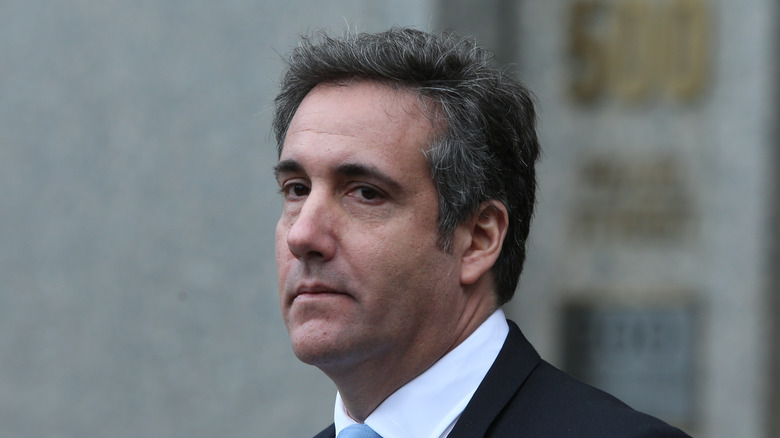Why Do Some Powerful People Have 'Fixers' And What Do They Do?
It should come as no surprise that the wealthy and powerful live their lives differently than the rest of society. When it comes to the middle classes, generally only those on the upper end can afford to hire help, such as a nanny or the occasional cleaner. The super wealthy, on the other hand, can hire whole teams of people: accountants, housekeepers, personal attorneys, and so on.
Some wealthy and powerful people have what are called "fixers." As Vice reports, their job description is, by and large, exactly what the title says: they fix things for the person who needs fixing. The variety of things that may need to be fixed, and the ways in which the fixer can go about fixing them — legal, quasi-legal, and outright illegal — are varied and legion. Furthermore, the fixer can act before, during, or after a situation becomes a problem. And the fixer can do their thing both in their boss' home country and — in a particular minefield where fixers may come in handy — in foreign countries.
A Graduate-Level Valet
There was a time in history when no self-respecting, monied gentleman or lady would step outside of their home without their valet a step or two behind them (in the photo above is then-Prince Charles and his former valet, Michael Fawcett). Merriam-Webster defines a valet as "a man's male servant who performs personal services (such as taking care of clothing)" and, in a broader sense, "an employee (as of a hotel or a public facility) who performs personal services for customers." In other words, a valet is someone who does what needs to be done for the person asking.
Think of a fixer as a graduate-level valet. And we're not using the phrase "graduate-level" particularly loosely here; one fixer interviewed by Vice, Hank Sheinkopf, has "several" advanced degrees, as described by the publication, in addition to being an Orthodox rabbi, because why not. And it's that wide range of knowledge and skills that can be called upon to help out their boss whenever a fixer is needed. This skill set can be used to make business deals, help keep their employer out of trouble with the authorities, help their boss avoid stepping into it when navigating the minefield of another culture, and so on.
'You Just Show Up'
When it comes to sealing deals, Hank Sheinkopf tells Vice that mostly what he has to do is be present. "You just show up. The fixer's main job is to show up and shut up. All your opponents should be doing is looking at you in a $3,000 suit," he says, adding that, for added flair, it helps to throw them off by wearing something unexpected, such as a Mickey Mouse watch. By having a fixer show up to a meeting, there's an implied threat. Because the Big Boss sent his fixer, those in the room know that they (the Big Boss) is prepared to have their man do their dirty work.
However, in some cases, it's better to use honey rather than vinegar. Just ask Texas political reporter R.G. Ratcliffe, who's covered plenty of powerful people and their fixers in his day. He notes that pulling favors can often get results and cites one example of a fixer smoothing things over with a devoutly Catholic politician by giving them an audience with the pope. Of course, sometimes fixers' "favors" for their beneficiaries cross the line between favors and bribes. As Mother Jones notes, oil company executives, for example, have been known to employ fixers who pay bribes as the need arises.
Damage Control
Sometimes a fixer's job can come down to simple damage control; when the Big Boss has stepped in it, or is about to step in it, the fixer can work his or her magic to minimize the damage.
For years, it seems that Donald Trump's fixer, Michael Cohen (above), who was a lawyer, spent less time practicing law and more time trying to control the narrative around his boss. Religion News Service, which comes out and calls Cohen Trump's "fixer," provides an example: Back in 2016, Trump was courting the vote of evangelical Christians and had the backing of Jerry Falwell Jr. However, "racy" photos of him were known to exist, and their publication could have spelled doom on multiple levels. As Reuters explains, Cohen "intervened" on behalf of the person who owned the photos and saw to it that those photos were destroyed. Similarly, according to The Daily Beast (which also unabashedly calls Cohen Trump's "fixer"), Cohen testified that videotapes that could implicate Trump in the assault of protestors "mysteriously disappeared," as the outlet says.
The Stakes Aren't Always So High
It's not just sealing big business deals and controlling the narrative about a politician that is the domain of the fixer. Film productions live and die by fixers, particularly in places that don't normally host film productions.
As Movie Mogul Productions notes, hiring a local fixer is going to be indispensable when filming on-location, whether the location is a remote village in a foreign land or a developed American city that just doesn't happen to have a lot of film production going on. They'll have knowledge of local working conditions, whose permission is needed and how to get it, and so on, ultimately helping productions find the quickest avenues for what they need at the lowest cost possible. Journalists use fixers, too. As Language Humanities notes, they perform many of the same roles that movie production fixers do, including simply knowing whom to ask for this or that. In some high-stakes situations, a fixer may help a journalist navigate local culture and even help get information out of a reluctant local source.
Finding a fixer, and the dangers of being one
If you think you need a fixer, you may find hiring one more difficult than you thought it might be. For starters, this isn't exactly a job title that someone puts up on LinkedIn or a job site ("there's no Angie's List for fixers," writes Fred Clark in Slacktivist); you just have to know the right person or people. Which brings us to our second point: If you need a fixer and don't have one, you're unlikely to get one. As Lifehack points out, fixers are often the business associates or school classmates of the people who need them; if you don't already have a fixer, then you probably don't know anyone capable of being your fixer.
Then there's the fact that having a fixer may come back to bite you in the butt. As Clark writes, if you've paid a fixer to bribe someone, that person now has the information — and possibly the receipts — and could use it to blackmail you. Or your fixer could grow a conscience, as did Michael Cohen, and start spilling the tea. And if word gets out that you are or have been someone's fixer, your non-fixer professional options could be limited. "If you're a lawyer in 'the secrets business' then it's difficult to also be a lawyer in any other kind of business," Clark writes.





